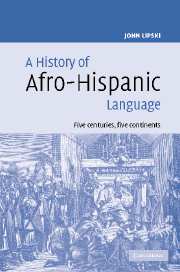Book contents
- Frontmatter
- Contents
- Acknowledgments
- Note on the Appendix
- Introduction
- 1 Africans in the Iberian peninsula, the slave trade, and overview of Afro-Iberian linguistic contacts
- 2 Early Afro-Portuguese texts
- 3 Early Afro-Hispanic texts
- 4 Africans in colonial Spanish America
- 5 Afro-Hispanic texts from Latin America: sixteenth to twentieth centuries
- 6 Survey of major African language families
- 7 Phonetics/phonology of Afro-Hispanic language
- 8 Grammatical features of Afro-Hispanic language
- 9 The Spanish-Creole debate
- References
- Index
5 - Afro-Hispanic texts from Latin America: sixteenth to twentieth centuries
Published online by Cambridge University Press: 24 February 2010
- Frontmatter
- Contents
- Acknowledgments
- Note on the Appendix
- Introduction
- 1 Africans in the Iberian peninsula, the slave trade, and overview of Afro-Iberian linguistic contacts
- 2 Early Afro-Portuguese texts
- 3 Early Afro-Hispanic texts
- 4 Africans in colonial Spanish America
- 5 Afro-Hispanic texts from Latin America: sixteenth to twentieth centuries
- 6 Survey of major African language families
- 7 Phonetics/phonology of Afro-Hispanic language
- 8 Grammatical features of Afro-Hispanic language
- 9 The Spanish-Creole debate
- References
- Index
Summary
The Afro-Latin American bozal corpus
Although Afro-Hispanic language was originally forged in West Africa, Portugal, and southern Spain, it was in Spanish America that successive generations of African-born slaves and free laborers acquired the Spanish language in the most diverse circumstances, and impressed those around them by their approximations to natively spoken Spanish. The earliest Latin American bozal texts come from highland mining regions in Peru, Bolivia, Mexico, and Colombia, and probably owe more to imitation of the already well-established stereotype of the habla de negros in Spain than from actual observation of Africans' speech in the colonies. By the end of the eighteenth century, poets, playwrights, short-story writers, and novelists had accumulated sufficient observational evidence on Afro-Hispanic language as to incorporate plausible (although probably exaggerated) imitations in their literary works. Occasional travelers' accounts, court transcriptions, legal documents, military reports, and sundry letters and testimonies provide non-literary corroboration of bozal language. The trickle of texts antedating the nineteenth century quickly became a torrent of literary, musical, and folkloric production during the nineteenth century, as thousands of Afro-Argentines, Afro-Uruguayans, Afro-Peruvians, Afro-Puerto Ricans, and especially Afro-Cubans took their places in poems, songs, stories, and novels, reflecting demographic events which brought large numbers of African-born slaves to these regions in a relatively short period of time. The present chapter surveys the most salient Afro-Latin American bozal texts as well as various less easily classifiable linguistic byproducts of the African diaspora in Spanish America.
- Type
- Chapter
- Information
- A History of Afro-Hispanic LanguageFive Centuries, Five Continents, pp. 129 - 196Publisher: Cambridge University PressPrint publication year: 2005



